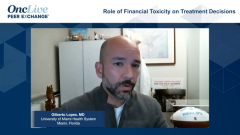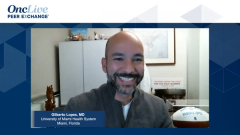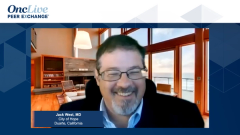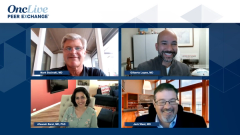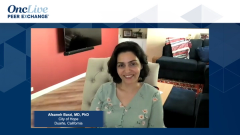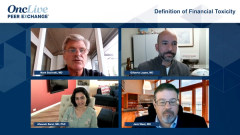
Impact of Payers on the Costs of Drugs
Jack West, MD, and Gilberto Lopes, MD, share their thoughts on the impact of payers when dealing with the cost of treatments.
Episodes in this series

Jack West, MD: I would love to have the FDA factor in costs, financial impact, and some semblance of value to whether drugs should be sanctioned, should be approved. For instance, if there is a drug that is a lateral move in efficacy and tolerability, but significantly less expensive, that’s an incremental benefit. I think that should be factored in. You could run a trial, if it came in the same, but looking at the cost, that should be valued as much as significantly improving some hematologic or nonhematologic toxicity. I think that if a drug is very expensive and provides little or no demonstrated benefit over things that we already have, I don’t know if we need 5 ALK inhibitors or 8 immune checkpoint inhibitors that are all comparable and many of them showing the same efficacy against an old, obsolete comparator. I think it would be reasonable and appropriate for the FDA to look at, “OK, is this coming at a price that is going to change anything? Or is it just going to come in 2% or less different?” I think many companies will rise no further than the bare minimum that is asked of them, and because of that, the FDA absolves itself of any role in price and is hands off; they don’t have anything to do with that. Because of that, we are in this mess as a country, of getting so little for the incredible amount that is spent on health care in general, and cancer in specific, relative to every other health care system.
Mark Socinski, MD: Yes, we need someone to be the first disruptor, as you said. We have a number of PD-1, PD-L1 inhibitors coming onto the market, and to my knowledge, to date there hasn’t been a disruptive cost strategy employed. I can’t believe it wouldn’t be welcomed by the payers. Very quickly, how often does the cost of the drug we’re dealing with, appealing to a payer, and all these sort of things, how often does it come up in each of your practices? Is this something that happens every week? Do you have people that deal with it, or do you deal with it? What’s it like?
Jack West, MD: I would say we deal with it all the time. It’s baked in so much that we don’t think about it. If drugs weren’t as expensive as they are, we wouldn’t have to do peer-to-peer discussions for standard-of-care therapies. A challenging and frustrating aspect of what we do is we have to move heaven and earth to get treatments that we would say the evidence strongly supports—let alone things that are a bit more of an extrapolation. But having to pay a king’s ransom for many of these medications makes everything we do so much less efficient because we have to spend our time waiting for justification to do something that we shouldn’t be wasting our time doing.
Mark Socinski, MD: Gilberto, did you have a comment about that? I didn’t mean to cut you off, or have Jack cut you off before.
Jack West, MD: Sorry.
Gilberto Lopes, MD: Jack made excellent points. I was going to comment on your last comment and say that in this country [United States], we haven’t seen drugs come in at different price points, it isn’t something we’re used to seeing. But when I was practicing in Singapore, for instance, gefitinib had just been taken off the market in the United States because the patients not selected for EGFR trials didn’t show a benefit, but we thought it had a benefit in patients who were EGFR-mutated, so gefitinib stayed on the market in Asia. Gefitinib came at a discount compared to erlotinib, so it quickly became the drug used by 80% of patients and oncologists because of the price competition. So, it’s not like you can’t have competition based on price in health care, and in oncology in particular, but it’s just that in this country, everybody’s afraid of decreasing the price today, so when they have the next drug, another company will come in and decrease their prices as well. Of course, there isn’t competition if we only have 1 drug per indication, but we now have a number of different options in the PD-1, PD-L1 arena, where I would welcome to see some price competition.
Transcript Edited for Clarity


